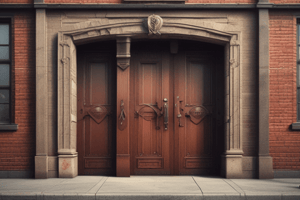Podcast
Questions and Answers
What factors determine the type of door chosen for a property?
What factors determine the type of door chosen for a property?
- Style, climate, and intended use (correct)
- History and location
- Size and weight
- Color and price
What is a disadvantage of wooden doors?
What is a disadvantage of wooden doors?
- They are maintenance-free
- They are not aesthetically pleasing
- They do not require sealing
- They may sag over time (correct)
Which type of door is known for its classic appearance and versatile nature?
Which type of door is known for its classic appearance and versatile nature?
- Metal doors
- UPVC doors
- Composite doors
- Wooden doors (correct)
Where are metal doors commonly used?
Where are metal doors commonly used?
What is a characteristic of UPVC doors?
What is a characteristic of UPVC doors?
Which material is known for requiring regular maintenance to preserve its condition?
Which material is known for requiring regular maintenance to preserve its condition?
What is an advantage of wooden doors?
What is an advantage of wooden doors?
Why are metal doors often designed to meet various security standards?
Why are metal doors often designed to meet various security standards?
Which type of door is best suited for both interiors and exteriors?
Which type of door is best suited for both interiors and exteriors?
What are the advantages of composite doors?
What are the advantages of composite doors?
Which type of door is resistant to weather conditions, pests, and fire?
Which type of door is resistant to weather conditions, pests, and fire?
What is a drawback of metal doors?
What is a drawback of metal doors?
What is a drawback of sliding doors mentioned in the text?
What is a drawback of sliding doors mentioned in the text?
What materials can sliding doors be made from?
What materials can sliding doors be made from?
Why are UPVC doors considered cost-effective over time?
Why are UPVC doors considered cost-effective over time?
Which type of door is ideal for larger openings?
Which type of door is ideal for larger openings?
What do composite doors mimic without the maintenance requirements?
What do composite doors mimic without the maintenance requirements?
What is a potential drawback of hinged doors as mentioned in the text?
What is a potential drawback of hinged doors as mentioned in the text?
Beside fiberglass, what is another material that composite doors combine?
Beside fiberglass, what is another material that composite doors combine?
Which type of door is suitable for enhancing natural lighting?
Which type of door is suitable for enhancing natural lighting?
Flashcards are hidden until you start studying
Study Notes
Types of Doors
Doors play a vital role in architecture, serving as entryways and barriers while also fulfilling aesthetic and practical functions. The type of door chosen depends on factors such as the property's style, climate, and intended use. In this article, we will explore the different types of doors based on the materials they are made from and their mechanisms, focusing on wood, metal, plastic (UPVC), sliding, composite, and traditional hinged doors.
Wooden Doors
Wooden doors are popular for their classic appearance and versatility. They can be custom-made with decorative designs, stained or painted finishes, and are suitable for both interiors and exteriors. Wood is relatively easy to work with and can be shaped into various patterns. However, wood requires regular maintenance to preserve its condition.
Advantages of wooden doors include durability, good insulation, and aesthetically pleasing appearances. Despite these benefits, wooden doors have some drawbacks, such as requiring periodic sealing against moisture absorption and potential sagging over time.
Metal Doors
Metal doors offer strength and durability. They are often used in industrial settings, commercial premises, and fortified residential properties. Metal doors have high resistance to wear and tear, including corrosion, and can be designed to meet various security standards.
UPVC Doors
Doors made of unplasticized polyvinyl chloride (UPVC) are a newer innovation. These doors are energy-efficient, low maintenance, and can mimic the appearance of wood and other materials without the inherent limitations of those materials. UPVC doors are resistant to weather conditions, pests, and fire. They require minimal upkeep, making them a cost-effective option over time.
Sliding Doors
Sliding doors, also called Patio doors, glide horizontally along tracks fixed to the ceiling and floor. They are ideal for larger openings and provide excellent access to outdoor spaces. Sliding doors come in various materials, including wood, metal, and UPVC, and can incorporate glass panels for increased light and visibility.
Advantages of sliding doors include their space-saving design, suitability for large openings, and potential for enhanced natural lighting. However, installation can be complex, and the tracks may attract dust and debris. Additionally, maintaining privacy can be challenging if the sliding door does not have blinds or curtains.
Composite Doors
Composite doors combine multiple materials, such as fiberglass and PVC-u thermal insulation, to create a robust and attractive door. They offer the appearance of wood without its maintenance requirements and can be engineered for additional security features.
Advantages of composite doors include durability, low maintenance, energy efficiency, and customizable design options. However, they can be more expensive than traditional wooden or metal doors.
Hinged Doors (Traditional)
Hinged doors are the most common type of interior door, swiveling on hinges that attach them to the surrounding wall. These doors may have panels made from various materials like wood, glass, or UPVC.
In conclusion, understanding the different types of doors is crucial when selecting one for your property. Factors like material choice, environmental conditions, functionality, and budget should all be considered before making a decision.
Studying That Suits You
Use AI to generate personalized quizzes and flashcards to suit your learning preferences.




